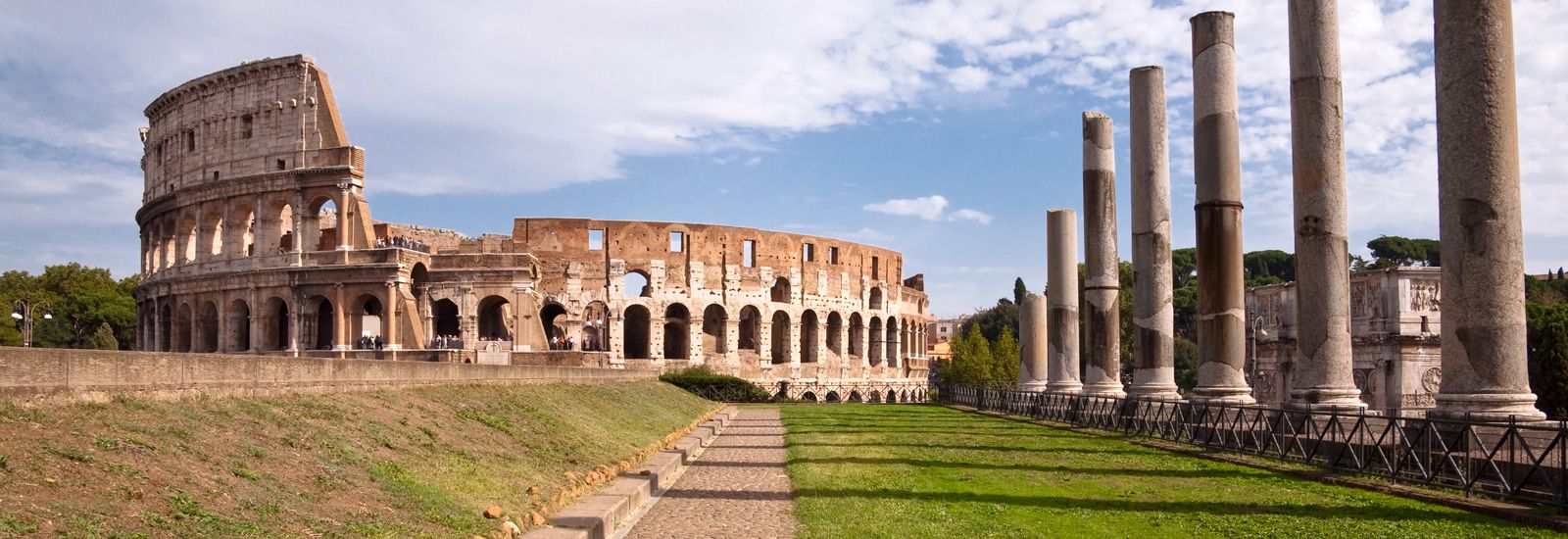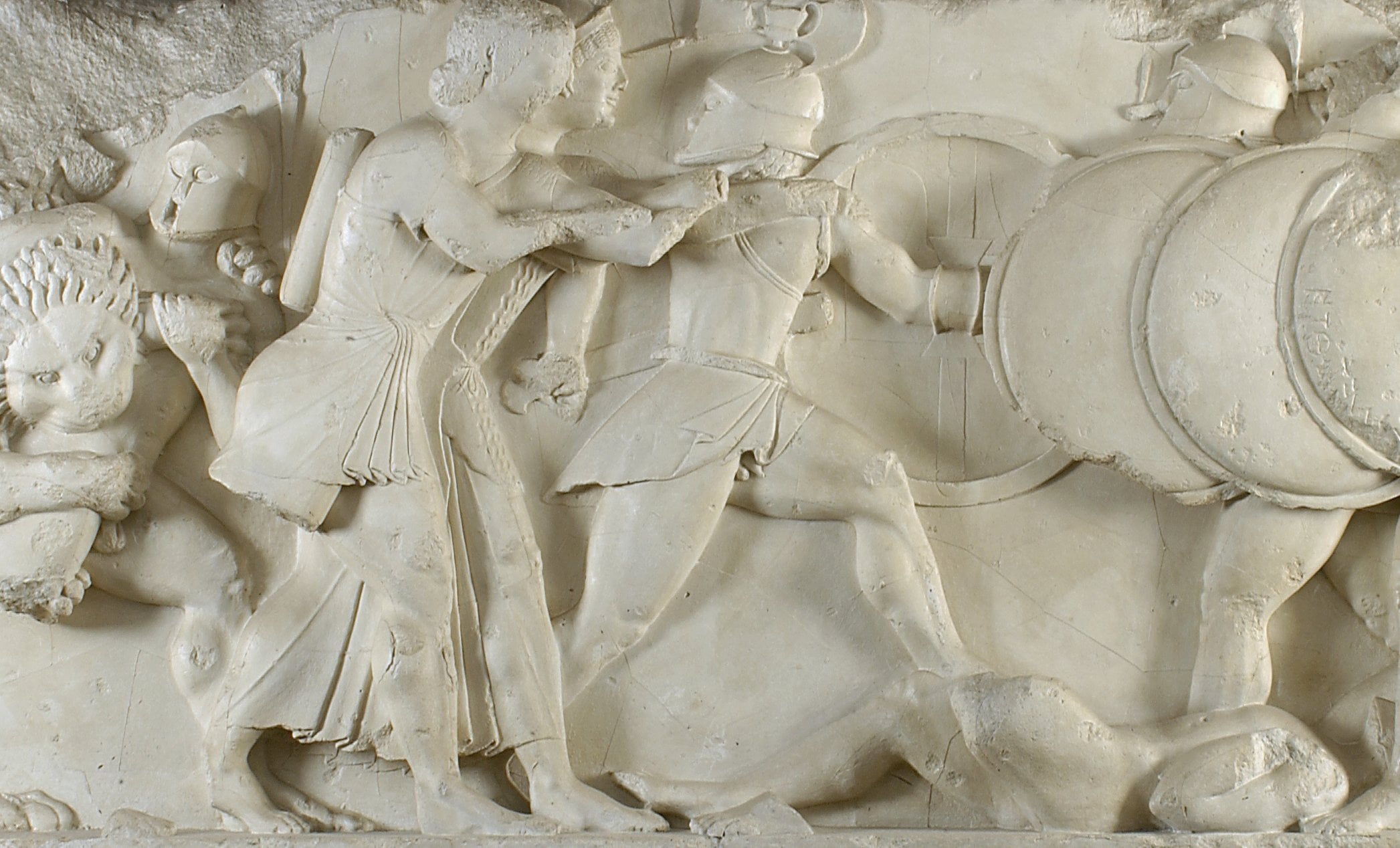
History (Ancient and Modern)
Course overview
UCAS code: V118
Entrance requirements: AAA
Course duration: 3 years (BA)
Subject requirements
Required subjects: Not applicable
Recommended subjects: History
Helpful subjects: Classical Civilisation, Ancient History, a classical language or a modern language
Other course requirements
Admissions tests: None in 2025
Written Work: One piece
Admissions statistics*
Interviewed: 72%
Successful: 23%
Intake: 24
*3-year average 2022-24
History contact
Tel: +44 (0) 1865 615000
Email: [email protected]
Classics contact
Tel: +44 (0) 1865 288391
Email: [email protected]
Unistats information for this course can be found at the bottom of the page
Please note that there may be no data available if the number of course participants is very small.
About the course
The Ancient and Modern History course enables students to study Afroeurasian history from the Bronze Age Mediterranean, through the Greco-Roman period, late antiquity, the Middle Ages and the early modern period, right up to British, European and World history in the present day. Fruitful comparisons between societies abound, and the methods by which we study them are mutually illuminating. You do not need to have a qualification in Latin or Greek to do this course and can learn either from scratch if you want to while here.
The extraordinary range of choices (more than 90 options) for this course reflects the breadth of interests of those who teach here. The Oxford Classics and History Faculties are world-famous for teaching and research. The people who will teach you here will often be leading researchers in their field, with lecturers encouraged to put on new courses which reflect their own interests.
Oxford also possesses exceptional library provision for History in:
• the Bodleian Library
• the History Faculty Library
• the Bodleian Art, Archaeology and Ancient World Library and the Weston Library’s special collections
• as well as a dedicated Classics Centre.
 |  |  |
'I have really enjoyed my degree in Ancient and Modern History. It has given me the flexibility to study a wide array of topics over a period spanning from Archaic Greece to the twenty-first century. A joint-school degree challenges you to consider different approaches and methodologies to history, as well as encourages you to interact with a variety of sources and materials. Your learning is supported by both History and Classics faculties allowing you access to double the experts, double the resources and double the opportunities which helps maximise your experience at Oxford. However, I think the real beauty of this is that you are exposed to lots of people and ideas, both furthering your research and helping you establish a brilliant network of professional and personal connections; I have met many of my closest friends because they read some form of ancient or modern history which I could relate to. I would strongly recommend this degree to anyone, especially those looking to read History. Why study history if you cannot understand and interpret it from as far back as it goes? If that resonates with you, then this is the right degree to choose.' Rachael | 'AMH is the best of both worlds. I had loved studying both History and Classical Civilisation at A-Level and wanted to continue engaging with history old and new. Choosing AMH gave me much more flexibility regarding ancient languages; I could study them if I wanted to but was under no obligation to. That way, if I suddenly had an epiphany in my second term or even second year (one which never came, alas) and wanted to study Greek, I had the time to change my mind. Doing AMH connects you with both the Classics and History Faculties. Since it’s a small cohort for both colleges and the university as a whole, you’ll do everything in college alongside other historians so there’s no fear of missing out on support or events. As you might expect, it’s mandatory for you to do an ancient paper for your Prelims and Finals. If you like the ancient world enough to choose this degree, though, this shouldn’t sound too bad. You’re given a lot of scope to choose a period of interest from either the Roman and Greek worlds in your first year and the options only increase from there. If material culture is your thing, for instance, there are a number of options for that. Truly, this degree’s only requirement of you is that you study a bit of Roman or Greek history. If that sounds great, you seriously won’t regret choosing it.' Rufus | I’ve really enjoyed my AMH course so far. When I was applying and realised there was an option to do a mix of classical and modern history, rather than confine myself to one of them, I instantly latched on to it. There’s such a wide array of options to pick from that I can hone in on things I’m already interested in, or explore something I have no prior knowledge of, and both routes are equally engaging. I’m nearly halfway through my course and beyond the Disciplines papers, I haven’t had to touch any history past 1500, and haven’t had to do any British papers. Instead, I can jump around specific time periods and locations, and do papers covering centuries and multiple continents, which makes things a lot more fun for me. It also helps with revision because I can zoom in on particular events and even specific individuals (especially in the Ancient side where you can study the attitudes and approaches of ancient historians, a particular favourite of mine) or arrange things by theme, meaning I can bring in multiple case studies from various places and points in time. For me, the challenge of a university workload and schedule is more than made up for by the sheer fun of learning and applying new and varied content. Helen |
Unistats information
Discover Uni course data provides applicants with Unistats statistics about undergraduate life at Oxford for a particular undergraduate course.
Please select 'see course data' to view the full Unistats data for History (Ancient and Modern).
Please note that there may be no data available if the number of course participants is very small.
Visit the Studying at Oxford section of this page for a more general insight into what studying here is likely to be like.
History (Ancient and Modern)
A typical week
During the first year, you will be expected to:
- attend around four lectures each week
- participate in regular meetings with tutors to discuss work
- conduct independent research
- and write at least one essay a week.
In the second and third years you will have the opportunity to choose from an enormous variety of lectures. Your regular tutorials will be supplemented by faculty classes where you will discuss work with a larger number of students. The third-year thesis will give you the opportunity to engage in a piece of independent research.
Generally, students are very much in charge of their own timetable throughout their courses.
Tutorials are usually 2-4 students and a tutor. Class sizes may vary depending on the options you choose. There would usually be no more than around 12 students.
Most tutorials, classes, and lectures are delivered by staff who are tutors in their subject. Many are world-leading experts with years of experience in teaching and research. Some teaching may also be delivered by postgraduate students who are studying at doctoral level.
Visit our Academic Year page to find out more about how our teaching year is structured.
Course structure
Year 1
Courses | Assessment |
|---|---|
Four courses are taken:
|
First University examinations: four timed written exams |
Years 2 and 3
Courses | Assessment |
|---|---|
Six courses are taken:
|
Final University examinations: six timed written exams and one thesis; or five timed written exams, one extended essay and one thesis; optional additional language paper. |
Visit the History website and Classics website for the latest information on all course details and options.
The content and format of this course may change in some circumstances. Read further information about potential course changes.
Academic requirements
Qualification | Requirement |
|---|---|
A-levels: | AAA |
Advanced Highers: | AA/AAB |
International Baccalaureate (IB): | 38 (including core points) with 666 at HL |
Any other equivalent qualification: | View information on other UK qualifications, and international qualifications. |
Wherever possible, your grades are considered in the context in which they have been achieved.
Read further information on how we use contextual data.
Subject requirements
Recommended: | It is highly recommended for candidates to have History to A-level, Advanced Higher, Higher Level in the IB or another equivalent. |
|---|---|
Helpful: | A classical language, Classical Civilisation and Ancient History can be helpful to students in completing this course, although they are not required for admission. |
If a practical component forms part of any of your science A‐levels used to meet your offer, we expect you to pass it.
If English is not your first language you may also need to meet our English language requirements.
Astrophoria Foundation Year
If you’re interested in studying History (Ancient and Modern) but your personal or educational circumstances have meant you are unlikely to achieve the grades typically required for Oxford courses, then applying for a Foundation Year might be right for you.
Visit our Foundation Year course pages for more details of academic requirements and eligibility.
Applying
All candidates must follow the application procedure as shown on our Applying to Oxford pages.
The following information gives specific details for students applying for this course.
Admissions test
You do not need to take a written test as part of an application for this course in 2025.
Written work
Description: | All candidates for History courses are required to send in an argument-driven essay on a historical topic, written as part of their normal school or college work. Please do not send work that requires the assessor to read any source material; avoid source analyses or commentaries. The essay should be a maximum of 2000 words. Extracts from longer essays or pieces of project work are permissible, but should be selected so that they can stand alone and show the candidate's ability to make an argument. Please do remember to include the question which the essay is seeking to answer. If these requirements cause any problems, please contact the Tutor for Admissions at your college of preference. Note that in selecting work for submission you should choose a piece which has enthused you and on which you are willing to talk. Do not worry if you have changed your mind on the topic since writing it. Tutors are impressed by candidates who remain intellectually engaged with their work. Written work must be accompanied by a signed certificate (confirmed by the school or college) stating the circumstances under which the work was written. |
|---|---|
Deadline: | 10 November 2025 |
Read our further guidance on the submission of written work for more information, and to download a cover sheet.
What are tutors looking for?
Tutors are looking for intellectual curiosity, as well as a flexible approach to engaging with unfamiliar concepts or arguments and an enthusiasm for ancient history or classics, even if you have not studied them before. If you are shortlisted, you may be asked to discuss your submitted written work and personal statement during interview. Candidates may also be asked to read and talk about a short passage as part of the interview.
Visit the History website for more detail on the selection criteria for this course.
Careers
Oxford historians move on to careers in fields as varied as:
- law
- teaching
- investment banking and consultancies
- advertising
- accountancy
- the Civil Service
- publishing
- journalism and the media
- global charity work
- museums and librarianship and archive work.
Recent Ancient and Modern History graduates include a civil servant, a librarian and a charity campaign manager.
Mary-Kate says:
‘Through my joint course I developed skills in working flexibly and under pressure, enhanced my analytical skills and learnt to be independently minded. These have all proven to be invaluable assets in my career as a Fast Streamer for the Home Office. Being a Fast Streamer means that you follow an accelerated training and development graduate programme.’
Heather now works as a Lecturer in British History at the Humboldt University in Berlin. She says:
‘Learning to work independently and under time pressure as an undergraduate was the perfect preparation for an academic career. It gave me the skills I needed to teach successfully at a university level and the self-confidence necessary to publish and present my research before my peers.’
We don't want anyone who has the academic ability to get a place to study here to be held back by their financial circumstances. To meet that aim, Oxford offers one of the most generous financial support packages available for UK students and this may be supplemented by support from your college.
Fees
Please note that for full-time Home undergraduate students, current university policy is to charge fees at the level of the cap set by the government, which for 2026/27 is £9,790. For details of annual increases, please see our guidance on likely increases to fees and charges. In the 2027/28 academic year course fees for Home fee status students will rise to £10,050 (in line with the government fee cap).
Fee status | Annual Course fees |
| Home | £9,790 |
| Overseas | £43,600 |
Further details about fee status eligibility can be found on the fee status webpage.
For more information please refer to our course fees page. Fees will usually increase annually. For details, please see our guidance on likely increases to fees and charges.
Living costs
Living costs at Oxford might be less than you’d expect, as our world-class resources and college provision can help keep costs down.
Living costs for the academic year starting in 2026 are estimated to be between £1,405 and £2,105 for each month you are in Oxford. Our academic year is made up of three eight-week terms, so you would not usually need to be in Oxford for much more than six months of the year but may wish to budget over a nine-month period to ensure you also have sufficient funds during the holidays to meet essential costs. For further details please visit our living costs webpage.
Financial support
Home | A tuition fee loan is available from the UK government to cover course fees in full for Home (UK, Irish nationals and other eligible students with UK citizens' rights - see below*) students undertaking their first undergraduate degree**, so you don’t need to pay your course fees up front. In 2026 Oxford is offering one of the most generous bursary packages of any UK university to Home students with a family income of around £50,000 or less, with additional opportunities available to UK students from households with incomes of £32,500 or less. The UK government also provides living costs support to Home students from the UK and those with settled status who meet the residence requirements. *For courses starting on or after 1 August 2021, the UK government has confirmed that EU, other EEA, and Swiss Nationals will be eligible for student finance from the UK government if they have UK citizens’ rights (i.e. if they have pre-settled or settled status, or if they are an Irish citizen covered by the Common Travel Area arrangement). The support you can access from the government will depend on your residency status. |
Islands | Islands students are entitled to different support to that of students from the rest of the UK. Please refer the links below for information on the support to you available from your funding agency: |
Overseas | Please refer to the "Other Scholarships" section of our Oxford Bursaries and Scholarships page. |
**If you have studied at undergraduate level before and completed your course, you will be classed as an Equivalent or Lower Qualification student (ELQ) and won’t be eligible to receive government or Oxford funding
Additional Fees and Charges Information for Ancient and Modern History
There are no compulsory costs for this course beyond the fees shown above and your living costs.
Contextual information
Unistats course data from Discover Uni provides applicants with statistics about a particular undergraduate course at Oxford. For a more holistic insight into what studying here is likely to be like, please view the information below and explore our website more widely.
The Oxford tutorial
College tutorials are central to teaching at Oxford. Typically, they take place in your college and are led by your academic tutor(s) who teach as well as do their own research. Students will also receive teaching in a variety of other ways, depending on the course. This will include lectures and classes, and may include laboratory work and fieldwork. However, tutorials offer a level of personalised attention from academic experts unavailable at most universities.
During tutorials (normally lasting an hour), college subject tutors will give you and one or two tutorial partners feedback on prepared work and cover a topic in depth. The other student(s) in your tutorials will typically be doing the same course as you and covering the same topic. Such regular and rigorous academic discussion develops and facilitates learning in a way that isn’t possible through lectures alone. Tutorials also allow for close progress monitoring so tutors can quickly provide additional support if necessary.
Read more about tutorials and an Oxford education
College life
Our colleges are at the heart of Oxford’s reputation as one of the best universities in the world.
- At Oxford, everyone is a member of a college as well as their subject department(s) and the University. Students therefore have both the benefits of belonging to a large, renowned institution and to a small and friendly academic community. Each college or hall is made up of academic and support staff, and students. Colleges provide a safe, supportive environment leaving you free to focus on your studies, enjoy time with friends and make the most of the huge variety of opportunities.
- Each college has a unique character, but generally their facilities are similar. Each one, large or small, will have the following essential facilities:
- Porters’ lodge (a staffed entrance and reception)
- Dining hall
- Lending library (often open 24/7 in term time)
- Student accommodation
- Tutors’ teaching rooms
- Chapel and/or music rooms
- Laundry
- Green spaces
- Common room (known as the JCR).
- All first-year students are offered college accommodation either on the main site of their college or in a nearby college annexe. This means that your neighbours will also be ‘freshers’ and new to life at Oxford. This accommodation is guaranteed, so you don’t need to worry about finding somewhere to live after accepting a place here, all of this is organised for you before you arrive.
- All colleges offer at least one further year of accommodation and some offer it for the entire duration of your degree. You may choose to take up the option to live in your college for the whole of your time at Oxford, or you might decide to arrange your own accommodation after your first year – perhaps because you want to live with friends from other colleges.
- While college academic tutors primarily support your academic development, you can also ask their advice on other things. Lots of other college staff including welfare officers help students settle in and are available to offer guidance on practical or health matters. Current students also actively support students in earlier years, sometimes as part of a college ‘family’ or as peer supporters trained by the University’s Counselling Service.
Connect with us
Outreach programmes and events
Many academic departments and faculties at Oxford have dedicated outreach events and activities aimed at promoting their subject area(s) and supporting talented students from all backgrounds to apply to their courses.
University-wide events and resources
In addition to exploring department-run activities, we recommend checking out the outreach event calendar for upcoming University-wide events and other subject and college activities.
Subject-specific resources supporting supercurricular engagement for all ages can also be found via the University's Digital Resource Hub, suggested subject resources webpage and Oxplore, our online learning platform for 11-to-18-year-olds.
UK state school students interested in this or similar courses may like to explore UNIQ, Oxford's free flagship outreach programme for students in their first year of further education. UNIQ offers a choice of academic residentials in over 30 courses and each year provides around 1,500 students with the opportunity to experience Oxford's teaching, explore student life and receive expert support with their application to university.
Prospective applicants can sign up to receive step-by-step support with their Oxford application.
Read more about Oxford's widening access initiatives and other ways to connect with us before applying.

